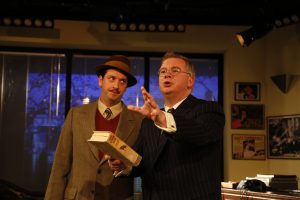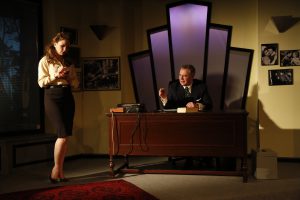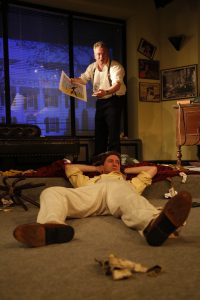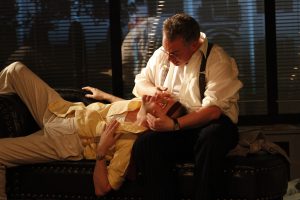
Headline: The Making of “Gone with the Wind”. Subline: Big Boss in Trouble. We write the year 1939. The political situation in Europe is unstable. A new war is in the offing. But legendary Hollywood producer David O. Selznick could not care less. He is plagued with other problems. He is honestly in real trouble. After having fired a dozen of well-known film directors, he is feverishly looking for another one to direct his latest movie in progress “Gone with the Wind.” By the way, the script too does not come up to his expectations. Also literary icons such as F. Scott Fitzgerald and John van Druden have been given the sack. Thus, Selznick desperately needs a new director as well as a new writer as soon as possible. So why not take Ben Hecht under contract, one of Hollywood’s greatest scriptwriters!

But that fellow has hardly heard of Margaret Mitchell’s bestselling epic, let alone read a single line of her famous book. Can you believe it? In order not to lose time, Selznick gives Hecht a short synopsis of the story and offers him the gigantic sum of 15,000 bucks in case he delivers a revised screenplay within five days. A new director has also to be found. There is no better choice than charismatic Victor Fleming who is about to finish “The Wizard of Oz.” Three Hollywood celebrities and a film which – according to Selznick – will become one of the greatest movies ever made! Let us start work immediately, he orders and asks his devoted secretary Miss Poppenguhl (what a name!) to lock the door to his office for five days. And no phone calls please, whoever may call. The food is reduced to bananas and peanuts. Who on earth can survive on such frugal diet and be creative at the same time?
But let us have a look at what is happening on the stage of the English Theatre. We find ourselves in Selznick’s vast office, the large windows granting a view on the producer’s stately home across the lawn. The walls of his office are covered with colourful posters of some of his legendary films, including “A star is born”, “Tale of Two Cities” and many others, showing actors who were great stars in the thirties of the last century whom most of us even do not know by name. Sic transit gloria mundi – Hollywood’s fame is ephemeral, once most popular stars are completely forgotten long before they die. Selznick (Rory Murphy in the role of his life – fantastic) and Fleming (Edwin Flay extremely funny) are doing their best to work out all the characters in the novel, the audience is roaring with laughter.

Just imagine a grown-up man lying on the floor and feigning Melanie Wilkes in labour before giving birth to her first child. While this comedy is going on, Hecht (cool and professional) is typing wildly on an old typewriter while making sarcastic remarks about the two amateurish actors. As a matter of fact, Fleming and Hecht constantly clash. They cannot agree on a good many aspects concerning the realisation of the picture. While Selznick and Fleming are further attempting to work out other characters of the book, Hecht criticises Selznick’s indifference concerning the more than problematic situation of the Jews in Germany and asks the producer to join the Jewish Relief Fund. But Selznick, himself a Jew like Hecht, shows little interest in the matter. He wants to realise his movie. First things first. Period. By day three, Selznick’s once well organised office looks a complete mess. Banana skins, peanut shells and torn manuscripts are scattered all over the floor. Next day, the three “prisoners” are hungry, tired and aggressive. Tempers flare. They are craving for real food and a shower. Fleming and Hecht even attempt to escape. No chance. The door stays locked and Selznick insists on finishing the screenplay before he allows anybody to leave. By the end of day five film mogul Selznick asks: “Is there anything wrong with getting the job done – no matter what it takes?” Obviously he has the power to convince both Fleming and Hecht. And after a veritable end spurt a screenplay is completed that finds favour in Selznick’s eyes. Miss Poggenguhl (Clara Aileen Bowen in the role of the “ideal” secretary) staggering on her feet – she too had to stay awake during five days and nights – is finally allowed to unlock the door of Selznick’s office and free Fleming and Hecht from “prison.”

Selznick himself is beaming with satisfaction. No matter what the cost – I made my dream become true, he thinks and calls his father-in-law, Louis B. Mayer of MGM, another Hollywood legend: “Poppa, I have some very good news for you – we are making a movie.”
Curtain.
Epilogue: After all, this ordeal was worth its while. Millions of people around the world saw and enjoyed “Gone with the Wind”, one of the most successful film productions ever.
What a hilarious play! An American critic brought it to the point when writing “This play is an affectionate portrait of the legendary movie producer David O. Selznick and his collaborators.”
The audience thanked four gifted actors and director Paul Glaser for the outstanding performance of this rip-roaring play with witty dialogue and hilarious situations.
A few words about the playwright
Ron Hutchinson was born in County Antrim, Northern Ireland, in 1947. He wrote while working in several jobs, including carpet fitter, fish gutter and Social Security fraud investigator, and got his first break with a TV play for the BBC. This turned out to be the beginning of a great career as a playwright. His first stage play “Says I Says He” was followed by many others such as “Rat in the Skull”, “Beau Brummel” and “Dead on her Feet”.
Last but not least I have to confess that “Gone with the Wind” was the number one of my favourite books when I was fifteen years old. I read that novel in English from the very first to the last sentence, assisted by my father’s big dictionaries. I was so fascinated by the story, my heroes being Scarlett O’Hara and Rhett Butler, that I forgot the world around me. The book still sits on one of my book-shelves, in a very privileged position. The play was a nostalgic déjà vu for me. Thank you all on the set who made this evening at the TET an unforgettable one.
(Photos: Stefan Kock)
Final performance of “Moonlight and Magnolias” on June 22. 2019
Tickets under phone number 040 – 227 80 89, online booking under www.englishtheatre.de
Until September the TET will be on holiday. We will be back here as soon as we are informed about the next premiere.
